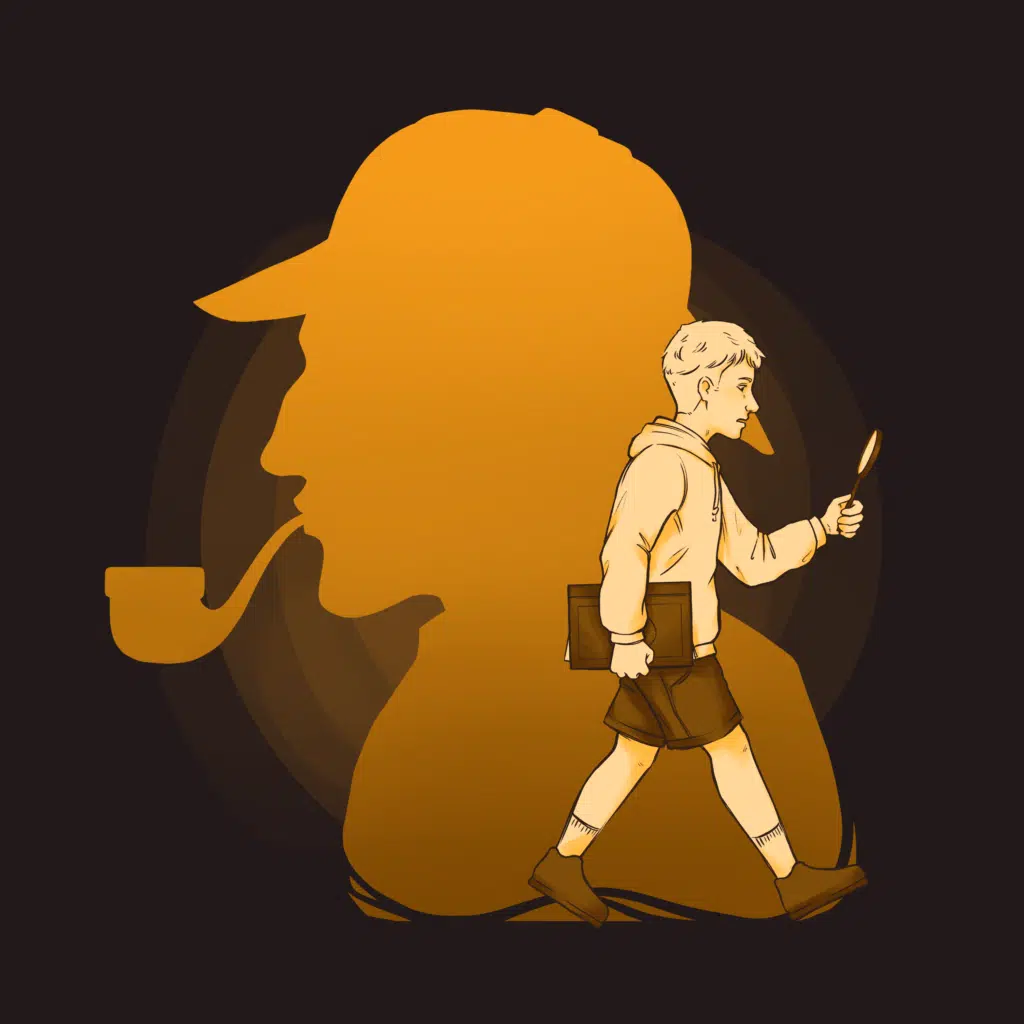By Robert Basler,
“My name is Sherlock Holmes. It is my business to know what other people do not know.”
The librarian knew me well. I was 11 years old and was no stranger to the dusty bookshelves at School 91, in Indianapolis. I loved biographies, science fiction and boyhood adventures, to be sure, but she knew that mysteries were my passion. When you’re only 11, mysteries tend to involve teenage sleuths searching for lost treasure. Tame stuff, not too many murders, but then, a cracking good mystery doesn’t need to involve wholesale slaughter. I think sometimes we lose sight of that.
“I have something you might like,” she told me one day when I was checking out a book about the Battle of New Orleans. That’s the battle that was fought after the War of 1812 was already over, only nobody in New Orleans knew it yet.
“You like mysteries, right? I think you would enjoy this guy Sherlock Holmes. He’s the greatest detective who ever lived. He’s British.”
Thanks to countless hours of reading about knights and jousts and broadswords and quests and drawbridges and portcullises, I loved all things British. That is, once I got past them burning down our White House and a few minor things like that. This was also long before I spent thirty-some years with Reuters, a very British company, which saw my Anglophilia take the occasional hit.
But I digress. I checked out a volume of Holmes stories which included the one she most recommended, a short novel called “The Hound of the Baskervilles.”
I couldn’t wait. I read several of the shorter stories right after school – it was a Friday, so no homework – and when we left for the movies with some neighbors that evening, I took the book with me and began reading “The Hound” in the back seat of the car. The print was kind of small, but that just showed it was a very grown-up book. I read a few pages, then flipped over to the next one, and whoa! I didn’t sign up for this! A drawing of a snarling, frothing dog, staring me right in the eyes like death itself, fangs poised at my throat. I slammed the book shut on my lap, but it was too late. I could not unsee that hellhound.
The face haunted my dreams that weekend, and even though I didn’t open the book again, and I returned it to the school library first thing on Monday morning, the image would not leave me alone.
Still, apart from the horrifying illustration, the other Holmes stories had been good. And if the sight of the snarling hound stuck in my mind, so did other images – a gaunt man in an Inverness cape and deerstalker cap, smoking a Calabash gourd pipe. I loved picturing Paddington Station, Charing Cross, Simpson’s on the Strand, Scotland Yard. They burrowed into a small boy’s imagination and began to take root. I checked the book out again and made myself stare at the hound until it no longer bothered me.
“But this is inconceivable—impossible. Mr. Holmes, you are a wizard, a sorcerer! How did you know it was there?”
“Because I knew it was nowhere else.”
That thing, right there. It’s called a Sherlockism. There are a lot of them in the Canon – which is what Holmes zealots call the entire body of work — and they deliver the moment so brilliantly that aficionados created that word for them. Here is another one, and I vividly recall reading it for the very first time, more than 60 years ago, and recognizing immediately that it was beyond perfect:
“Is there any point to which you would wish to draw my attention?”
“To the curious incident of the dog in the night-time.”
“The dog did nothing in the night-time.”
“That was the curious incident,” remarked Sherlock Holmes.
When I began working full-time as a journalist and friends told me I really should open a checking account, my very first check, number 001, was written to a downtown bookstore for “The Complete Sherlock Holmes.” Fifty-six stories and four short novels. I was hooked. I could lose myself in those yarns in my own apartment, puffing on my pipe with a piquant blend of Latakia and Perique tobacco. I’m afraid the only reason I didn’t buy myself a deerstalker was that there was no internet to order from in those days.
I would learn that much of what I thought I knew about the world’s first consulting detective didn’t come from the pen of Sir Arthur Conan Doyle at all, but rather, from the creative minds of magazine illustrators and movie and stage costumers. You can search the entire Canon and never find a deerstalker hat or a Calabash pipe.
“When you have eliminated the impossible, whatever remains, however improbable, must be the truth.”
You probably think the most famous Holmes quote is “Elementary, my dear Watson.” Nope, that’s not in the Canon. Don’t bother looking. Holmes does say, “Elementary” and “my dear Watson” a few times, just not together like that.
Of course, you won’t see the exact phrase, “Beam me up, Scotty,” in any “Star Trek” episode or hear Humphrey Bogart say, “Play it again, Sam,” in Casablanca. Popular culture has an amazing capacity for getting things slightly wrong and then perpetuating them.
When we got married, for our first anniversary Barbara and I visited London. It was my first-ever overseas trip. Of course, I had to make a pilgrimage to 221 Baker Street, Sherlock’s famous address. It was okay with me that there was nothing special there, it was nice just to see the Baker Street sign.
“‘All that I have to say has already crossed your mind,’ said he.
“‘Then possibly my answer has crossed yours,’ I replied.
Some 25 years after that first visit, we took our son to London. Already a fairly avid Holmes enthusiast, he wanted to pay a Baker Street visit. I warned him there would be nothing to see there, but he insisted. To our utter delight, a Georgian townhouse at that address had been turned into a Sherlock Holmes Museum and was a replica of Holmes’ and Watson’s suite of rooms.
In truth, the museum really sat between between 237 and 241 Baker Street, but it got special permission to use 221 when it opened to the public. Holmes buffs will recognize scenes straight from the stories. The slipper where Sherlock kept his pipe tobacco, the “VR” bullet-hole pattern – for Victoria Regina – that he made by shooting a revolver at the wall during a bout of boredom. We could scarcely believe our good fortune.
“Watson. Come at once if convenient. If inconvenient, come all the same.”
One nice thing about Holmes is that if you grow tired of reading Conan Doyle’s short stories and novels, you can try writing your own. I have a good friend in Santa Fe who is hugely into Holmes – my first clue was the 221b in his email address.
He found out there are a couple of societies that publish collections of Holmes pastiches once or twice a year. The competition to get selected for these books is fierce, and the rules they enforce to protect the franchise are draconian, but my friend John has had six or seven of his stories published. They recently even printed a whole book of just his stories, “The Undiscovered Archives of Sherlock Holmes”, and they are about to issue his first Holmes novel. This guy is so good, sometimes I think he really did find undiscovered archives in some attic somewhere.
John Lawrence’s meteoric success might not have happened, though. He showed me his very first story, “The Adventure of the Purloined Talisman,” to read before submitting it, and I couldn’t help noticing he killed off several regular Conan Doyle characters, including Sherlock Holmes himself. It was sort of a bloodbath, to be honest.
I told him I thought his publishers just might take a dim view of that, and he undid the damage and now he can’t turn out new stories fast enough for them. To show his gratitude, John named a character in one of his stories after me. A 19th century journalist, named Basler. What are the chances?
“You then went to the vicarage, waited outside it for some time, and finally returned to your cottage.”
“How did you know that?”
“I followed you.”
“I saw no one.”
“That is what you may expect to see when I follow you.”
Even Conan Doyle himself couldn’t kill Sherlock. He tried, in a story called “The Final Problem,” but had to resurrect the detective because of popular demand, including from his own mother. During my many years as a Reuters journalist I took great delight in the fact that Dr. Watson told his readers the report of Holmes’ death had appeared in “the Reuters dispatch in the English papers.”
Eventually, it turned out Holmes had just faked his own death, and he returned to solve more crimes. Think about that. The sheer beauty of it. Reuters gets immortalized by one of the most-beloved authors in all of English literature, but for what? For reporting something that didn’t really happen.
Now, there’s a reporter who had a very, very bad day. I just hope it wasn’t that Basler guy my friend John wrote about.
Robert Basler was a life-long journalist, spending most of his career with Reuters, based in New York, Hong Kong and Washington. He reported from Beijing to Beirut, shivered in Mongolia and sweltered in Singapore. He had rats in his room in old Rangoon and his ceiling swarmed with hyperactive geckos in Phnom Pehn and he wouldn’t trade a single minute of it. He now lives and writes in Indianapolis, and this is his fifth piece published by Esoterica.

